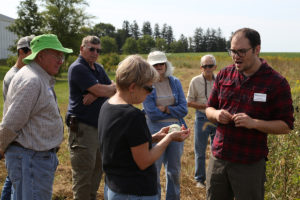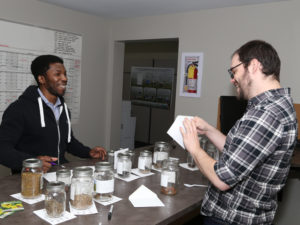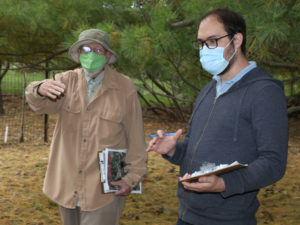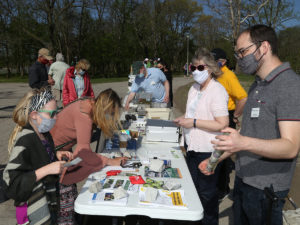Last month marked the departure of our pollinator and native plant expert David Stein as he heads back to work in his home state, our neighbors to the north, Minnesota. We are missing his passion and work ethic, but our Watersheds and Wildlife program continues as always and efforts are well underway to find his replacement.
David contributed to a large part of Prairie Rivers of Iowa’s continued efforts to impact public awareness and implementation of conservation practices to create native plant, pollinator and wildlife habitat to help improve soil and water quality while protecting the endangered rusty patched bumble bee and other species of greatest conservation need in Iowa. He was instrumental in creating a native seed bank and the development of many acres of habitat.
I recently visited with David as he reflected upon his work here at Prairie Rivers and his hopes for the future state of native habitat and pollinators in Iowa.
What do you feel was your biggest accomplishment while working at PRI?
There are a lot! I think both completing the National Fish and Wildlife Foundation grant and setting the stage for PRI’s next series of habitat/conservation projects was probably the biggest accomplishment during my time here. On top of that, raising awareness of pollinator issues and educating interested landowners on how to install habitat was also a major highlight of my work. Re-discovering the rusty patched bumble bee, and mapping out new sightings was definitely a high point for me too.
How do you feel the health of native habitat and pollinators is currently in Iowa? What progress has been made? Where do we need to go from here?
We have a long way to go, but I think we’re in a better place than we were a few years ago. Our outreach and education efforts, especially our work with counties, cities and landowners have definitely gotten the ball rolling, but a more hands-on-deck is always better. A coordinated conservation and restoration effort between non-profits, municipalities, farmers, landowners, homeowners, businesses, and interested individuals is really the best and only way forward to reverse pollinator and habitat decline.
What’s next for you?
Next, I’ll be working up at the Minnesota Department of Natural Resources in St. Paul. I’ll be able to be involved in habitat projects all throughout the state and be able to meet with a bunch of different stakeholders that are doing some amazing restoration work.
How has working at PRI enriched your professional life?
Working here has definitely enriched my professional life. I’ve been able to improve my own knowledge and passion regarding pollinator and wildlife conservation and directly apply it in real-time. I’ve also been able to connect and network with so many amazing stakeholders and partners from a variety of backgrounds. I know that I’ll be able to use these skills and lessons throughout my professional life moving forward.




